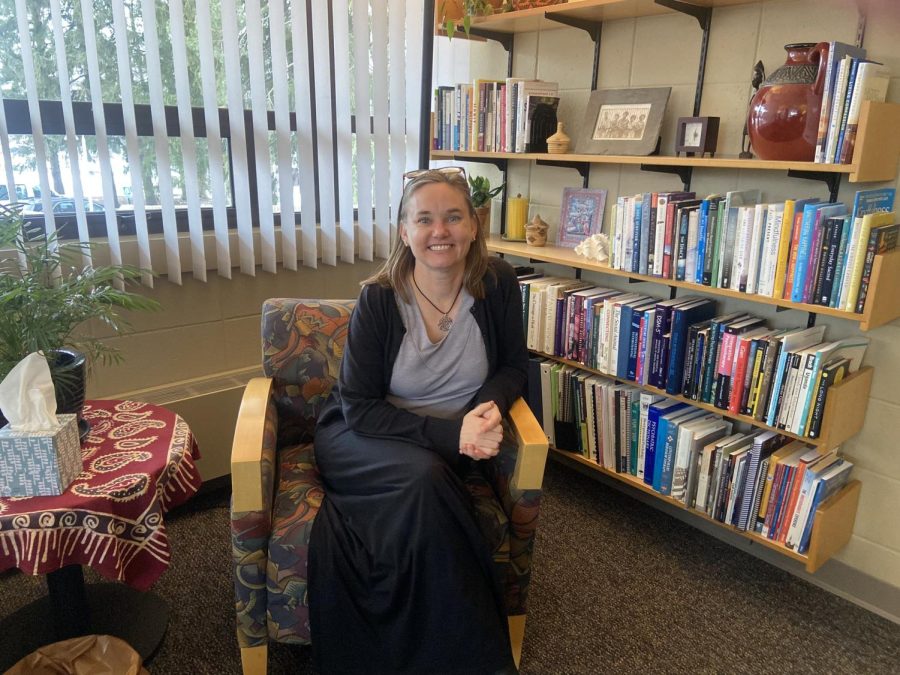Getting through SAD season
Winter darkness contributes to depression, but help is available
Dr. Kraegal and the Center for Counseling and Wellness are prepared to meet with students suffering from mental illness and are dedicated to figuring out a personalized plan
The weather in Grand Rapids during the winter is known for being cold and dreary. This can lead to a phenomenon referred to as seasonal depression (also known as seasonal affective disorder). While depression can affect people of all ages, it most commonly first appears during the ages of 18 through 25, making it a common mental struggle for college students. Calvin’s Center for Counseling and Wellness (CCW) has some resources for how to respond to the symptoms of seasonal depression.
Seasonal depression is a specific type of depression that occurs annually during the same season. It is often thought of as only appearing in the winter, however, that is often not the case. Kraegal explained that seasonal depression exists in all four seasons, but it is common in the winter because of the decrease of sunlight and the shorter days.
Seasonal depression symptoms
Depression can present itself through a variety of symptoms. Dr. Irene Kraegel, director of the Center for Counseling and Wellness, told Chimes that an excess or lack of sleep is a sign of the seasonal disorder. Adults should be getting between seven and nine hours of sleep every night. Other symptoms include changes in eating habits and irritability, according to Kraegel.
Yet the most prominent symptom of the disorder is, namely, sadness. This type of sadness is a prolonged feeling that can lead people to consider taking their own life, Kraegal told Chimes.. Kraegal described depression as having a negative filter that makes it difficult to find any positives in life. It is important to get help when experiencing these symptoms.
Dr. Emily Helder, a clinical psychology professor at Calvin, explained that the neurological aspects of depression are still being studied and there is a lot more to learn. Here’s what she does know: “Symptoms of depression are associated with a complex interaction of neurotransmitters, including dopamine, serotonin and norepinephrine and changes in activity in brain circuits, such as the frontal lobes and limbic system, that regulate mood and emotions,” Helder said. This means that depression is caused by chemical imbalances in the brain. “That’s why just like any other illness it makes sense for us to reach out for support and treatment and get a team around us,” Kraegel told Chimes.
Those suffering from depression may find it harder to take care of themselves. “The body perceives a depressive episode as a stressor and responds by releasing cortisol, a stress hormone. This can negatively impact the functioning of the immune system, making it more likely that the person could become ill,” Helder said.
How to respond
The Counseling and Wellness Center provides many opportunities for students suffering from depression or other mental health issues to get help. After a screening session with one of the center’s counselors, the center provides students with a customized treatment plan.
One of the remedies to seasonal depression that the CCW recommends mentally shifting one’s attitude towards the Michigan climate. Kraegel believes in embracing the winter weather, citing the Danish tradition of “hytte.” “It’s this idea that when it gets cold and dark it’s this beautiful time to be together with people inside and light candles and sit around fireplaces under blankets and drink hot chocolate,” Kraegel said. “That’s an example of a small but profound mental shift that can make a difference with seasonal depression.“
Altering spaces with warm lighting and comfortable furniture can benefit the mood during the winter months.
One way students can adopt this shift is by renting a lightbox from the CCW. “They are like medication in that they are stimulating a chemical hormonal response in our bodies by adding light upon waking in the morning so that our bodies can absorb that and have that chemical reaction first thing in the morning,” Kraegel said.
There are also some lifestyle changes that can help combat seasonal depression. Helder encourages students to “Engage in self care and or coping activities: exercise, eating healthy food regularly, maintaining good sleep and hygiene as much as possible, finding a friend that you trust that you can talk to about how you are feeling, journaling, meditation, and prayer.”
While all of those suggestions are great options, for many people more help is needed. “Sometimes we really need clinical interventions, absolutely if someone is experiencing something more like serious depression or anxiety or that kind of mental health response. We would definitely want them to come talk to one of our counselors here,” Kraegal said. The CCW offers individual and group therapy, workshops and digital resources, according to Kraegal.
As a community, it is important to support each other, especially during these dark winter months. “Nobody chooses to be depressed,” Kraegel said. This in turn, provides an opportunity to show up for one another as a community, she said. “That part of what it is to be a human being is we are all connected to each other, and we all need each other. Nobody is outside of that need for connection and community.”






